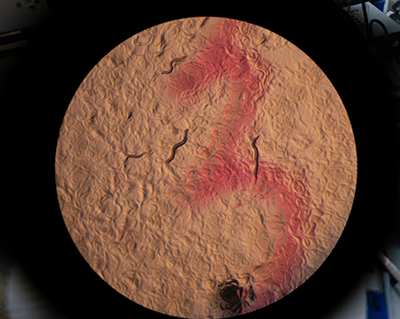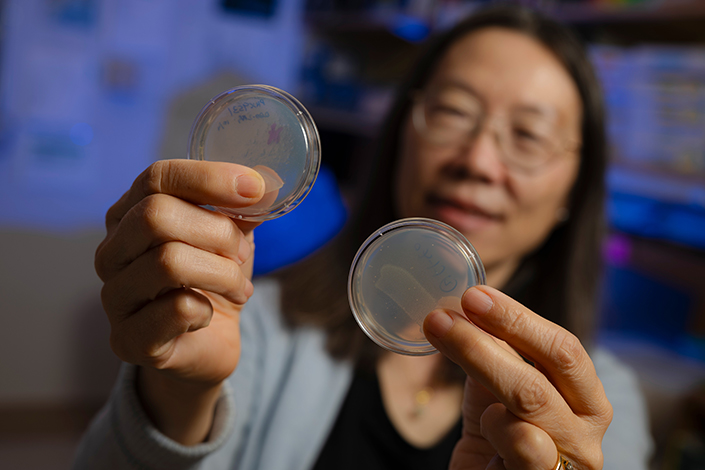Neurobiologist Yishi Jin Elected to the National Academy of Medicine
School of Biological Sciences professor is recognized for contributions to understanding mechanisms that underlie formation and function of the nervous system
Story by:
Published Date
Article Content
University of California San Diego Distinguished Professor Yishi Jin, who investigates the biological roots of the nervous system, has been elected to the National Academy of Medicine (NAM).
Jin, a member of the Department of Neurobiology in the School of Biological Sciences, is the Junior Seau Foundation Endowed Chair in Traumatic Brain Injury. She leads a laboratory that uses tiny roundworms (Caenorhabditis elegans) as a model to probe the molecular and genetic mechanisms underlying areas such as the formation of synapses — the sites in the nervous system where nerve cells, known as neurons, send signals to each other — as well as neural circuit functions. Her lab has also uncovered new genetic pathways related to critical nerve fibers called axons, a promising finding for neuroprotection following traumatic injuries, stroke and spinal damage.

She has been on the UC San Diego faculty since 2006. Membership to the prestigious National Academy of Medicine recognizes “individuals who have demonstrated outstanding professional achievement and commitment to service,” according to the academy.
“Professor Jin’s election to the National Academy of Medicine, one of the highest honors in health and medicine, is a proud reflection of her stellar achievements in the field of neurobiology,” said UC San Diego Chancellor Pradeep K. Khosla. “I warmly congratulate Professor Jin and enthusiastically applaud her contributions as a member of UC San Diego’s world-class faculty, which continues to be recognized for its pioneering leadership.”
Jin is one of 100 new NAM members who were announced this week during the organization’s annual meeting in Washington D.C. Jin’s election citation highlights her “groundbreaking discoveries on phylogenetically conserved mechanisms that drive synapse formation and that underlie central nervous system regeneration, providing fundamental knowledge and molecular targets which inform therapeutic strategies for ameliorating the effects of neuronal injury and degeneration.”

In 2022 Jin was elected to the National Academy of Sciences, one of the highest honors given to U.S. scientists and engineers. A previous chair of the Department of Neurobiology, Jin also serves as co-director of the Kavli Institute for Brain and Mind, an interdisciplinary research and education institute based at UC San Diego and the Salk Institute.
According to NAM, new members are selected by current members through a process that recognizes individuals who have made major contributions to the advancement of medical sciences.
Jin earned her B.S. degree in cell biology from Peking University, China, and her PhD from UC Berkeley. After completing a postdoctoral position in neurogenetics at MIT, she began an independent faculty position at UC Santa Cruz. She was elected as a fellow of American Academy of Arts and Sciences in 2019 and a fellow of American Society of Cell Biology in 2020. In 2017 she received the Javits Neuroscience Investigator Award by the National Institute of Neurological Disorders and Stroke.
Originally established as the Institute of Medicine in 1970 by the National Academy of Sciences, the National Academy of Medicine addresses critical issues in health, science, medicine and related policy and inspires positive actions across sectors. NAM works alongside the National Academy of Sciences and National Academy of Engineering to provide independent, objective analysis and advice to the nation and conduct other activities to solve complex problems and inform public policy decisions. The National Academies of Sciences, Engineering and Medicine also encourage education and research, recognize outstanding contributions to knowledge and increase public understanding of STEMM. With their election, NAM members make a commitment to volunteer their service in National Academies activities.
— With information from the National Academy of Medicine
Share This:
You May Also Like
Stay in the Know
Keep up with all the latest from UC San Diego. Subscribe to the newsletter today.




